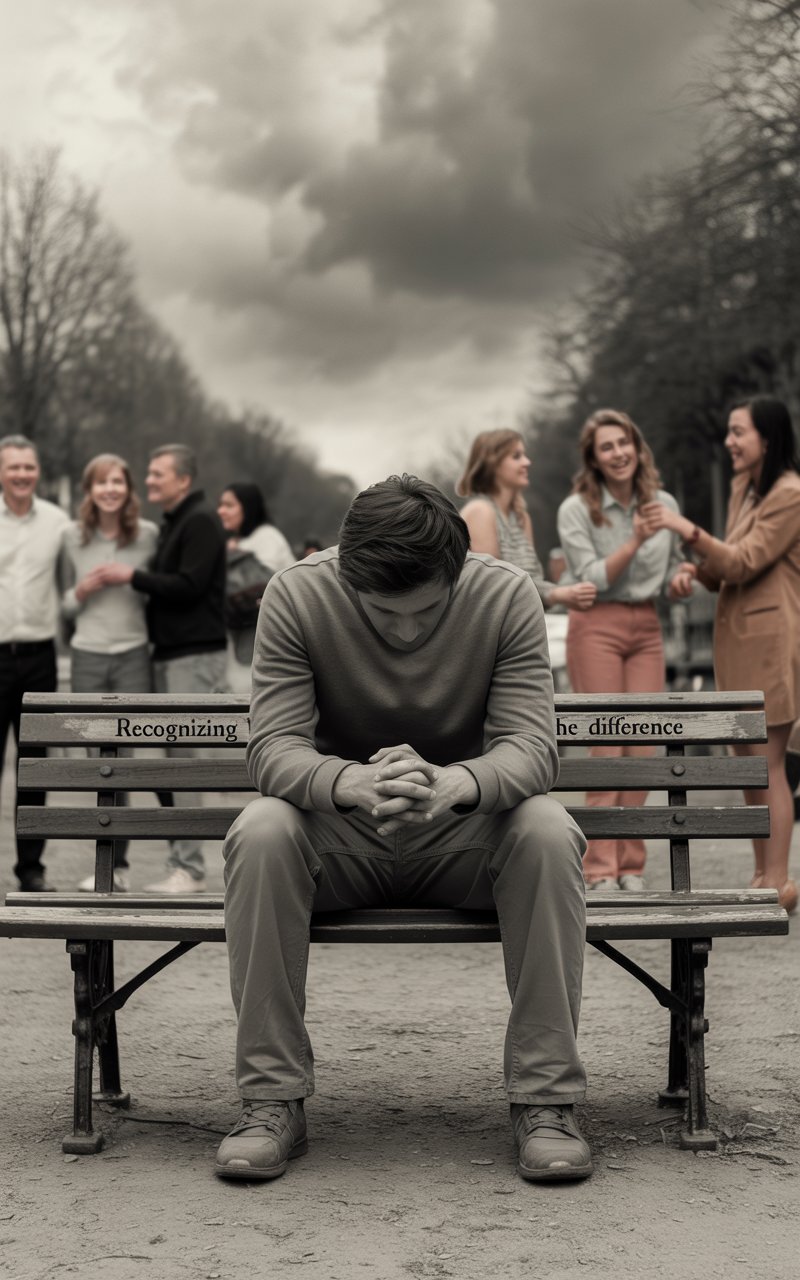
Loneliness vs Depression: 7 Signs to Know If You’re Feeling Depressed or Just Lonely
Introduction: When You’re Not Sure What You’re Feeling
Everyone has days when they feel off—but are you just lonely, or are you actually feeling depressed? The two emotions may seem similar, but they differ in their origin, duration, and impact. Many people confuse loneliness with depression, delaying the help they may need. Understanding this difference is a vital step toward emotional healing.
What Is Loneliness?
Loneliness is a feeling of isolation, of being emotionally disconnected from others—even if you’re physically surrounded by people. It often stems from unmet social needs, a lack of emotional connection, or major life changes like moving, divorce, or losing a loved one.
While loneliness can be painful, it’s often temporary and can be eased by reconnecting with people, joining a community, or investing time in meaningful relationships.
What Does Feeling Depressed Actually Mean?
Feeling depressed is more than just sadness or solitude. It’s a deep, persistent emotional state that affects how a person thinks, feels, and functions daily. Unlike loneliness, depression isn’t always tied to external events. It can happen even when someone seems to “have everything.”
When you’re feeling depressed, you may experience a loss of interest in life, constant fatigue, hopelessness, and even physical symptoms like body pain or appetite changes. This condition may need professional help and, in many cases, therapy or medication.
1. Emotional Depth: Surface Sadness or Persistent Numbness?
Loneliness usually comes with a longing for connection. People may feel sad but still crave closeness and companionship. In contrast, when you’re feeling depressed, the sadness often feels heavier—like emotional numbness. Even things you once loved no longer spark interest.
Lonely people want company; depressed individuals may withdraw completely.
2. Triggers: External or Internal?
Loneliness is typically triggered by an external situation—like being far from loved ones, ending a relationship, or social rejection. It is reactive.
Depression, however, can arise without any clear trigger. You might be surrounded by supportive people and still feel depressed. It originates internally and often lacks a direct cause, making it harder to explain or rationalize.
3. Motivation and Energy Levels
If you’re lonely, you may still have the energy to reach out, engage in conversations, or distract yourself with hobbies. When you’re feeling depressed, even basic tasks like getting out of bed or brushing your teeth may feel overwhelming.
This deep drop in energy and interest often separates loneliness from clinical depression.
4. Self-Worth and Thoughts
Lonely individuals often still maintain a stable sense of self-worth. They may feel temporarily unwanted but don’t internalize it as a permanent flaw.
People feeling depressed tend to experience negative self-talk, excessive guilt, or feelings of worthlessness. They may start to believe they are a burden or that nothing will ever change, which can lead to dangerous thought patterns.
5. Sleep and Appetite Changes
Loneliness might cause occasional trouble sleeping or emotional eating, but symptoms are often temporary.
On the other hand, feeling depressed can deeply disrupt sleep (insomnia or hypersomnia) and appetite (either binge eating or loss of interest in food). These physiological signs are key indicators of clinical depression.
6. Duration: Temporary vs Persistent
Loneliness often fades once social needs are met. A meaningful chat, attending a gathering, or reconnecting with a friend can lift the emotional fog.
Depression lingers. If you’re feeling depressed, the sadness doesn’t pass with social interaction or time—it persists for weeks or even months and interferes with your ability to function in daily life.
7. Impact on Life Functioning
Loneliness affects mood, but people can usually still manage work, relationships, and responsibilities. They may function outwardly but feel emotionally disconnected.
Depression is more disabling. It often leads to withdrawal, missed deadlines, declining hygiene, or deteriorating relationships. If you’re consistently feeling depressed, your ability to manage daily tasks may suffer significantly.
How to Understand Your Own Feelings
Understanding your emotions starts with self-awareness. Here’s a simple reflection checklist to help you evaluate what you’re feeling:
Ask Yourself:
- Do I feel better after spending time with people? (Loneliness)
- Do I enjoy activities I once loved? (If no, this may indicate depression)
- Have I felt this way for more than two weeks? (Red flag for depression)
- Am I eating and sleeping normally?
- Are my thoughts kind or harsh toward myself?
Journaling, meditation, or speaking to a mental health professional can help bring clarity.
When to Seek Help
Everyone feels lonely or down sometimes, but persistent sadness, lack of motivation, and disinterest in life are not normal—they’re signs of depression. If you’re unsure whether you’re just lonely or feeling depressed, it’s okay to reach out. Therapists can help you navigate this emotional maze.
Seeking help isn’t weakness—it’s courage.
Conclusion: Clarity Leads to Healing
Loneliness and feeling depressed can look similar on the surface, but they require different responses. While loneliness often resolves with connection and engagement, depression may require deeper emotional support and professional care.
Understanding what you’re going through is the first step to healing. Listen to yourself. Acknowledge your pain. And take the action your mind and heart truly need

